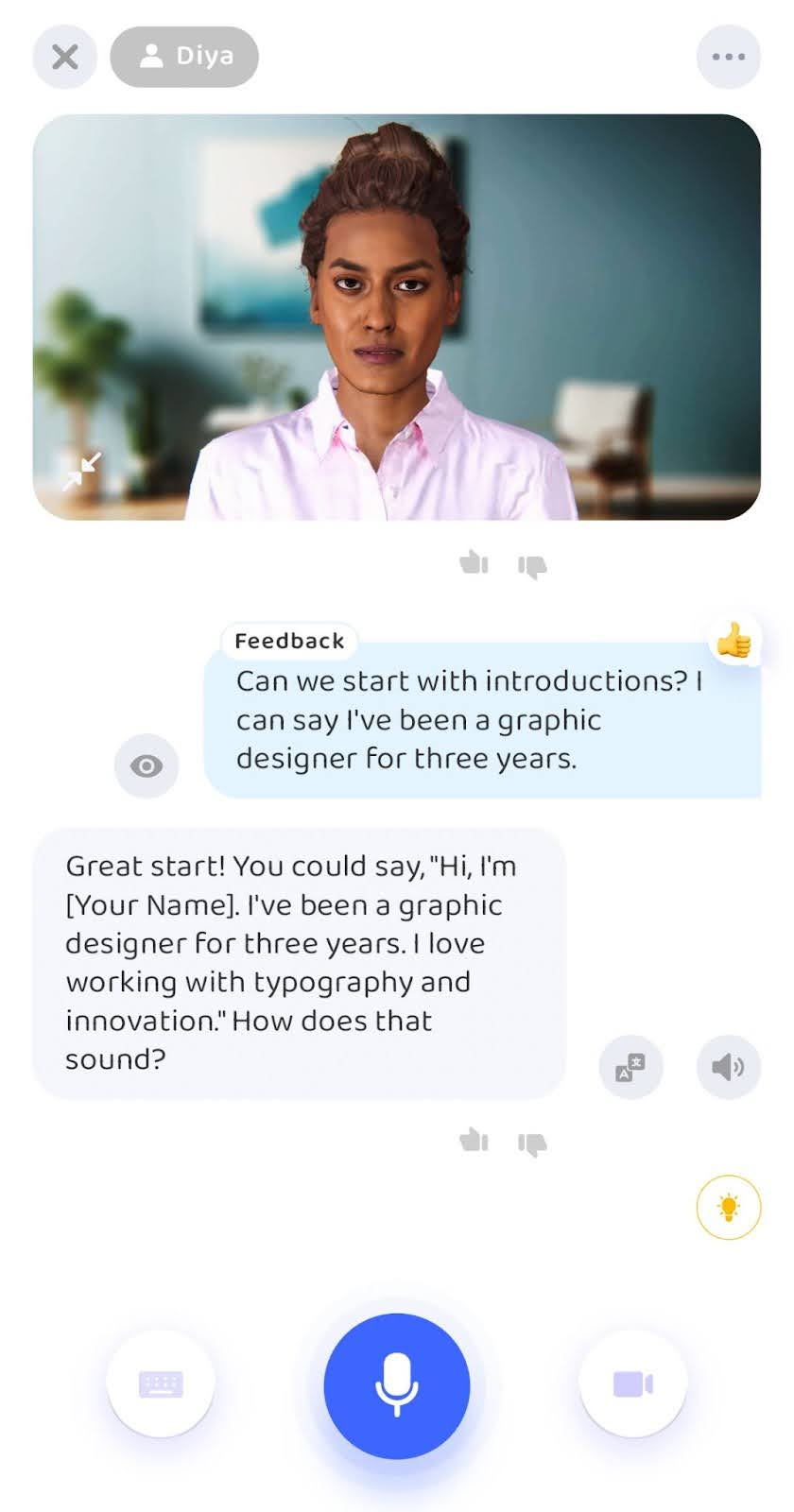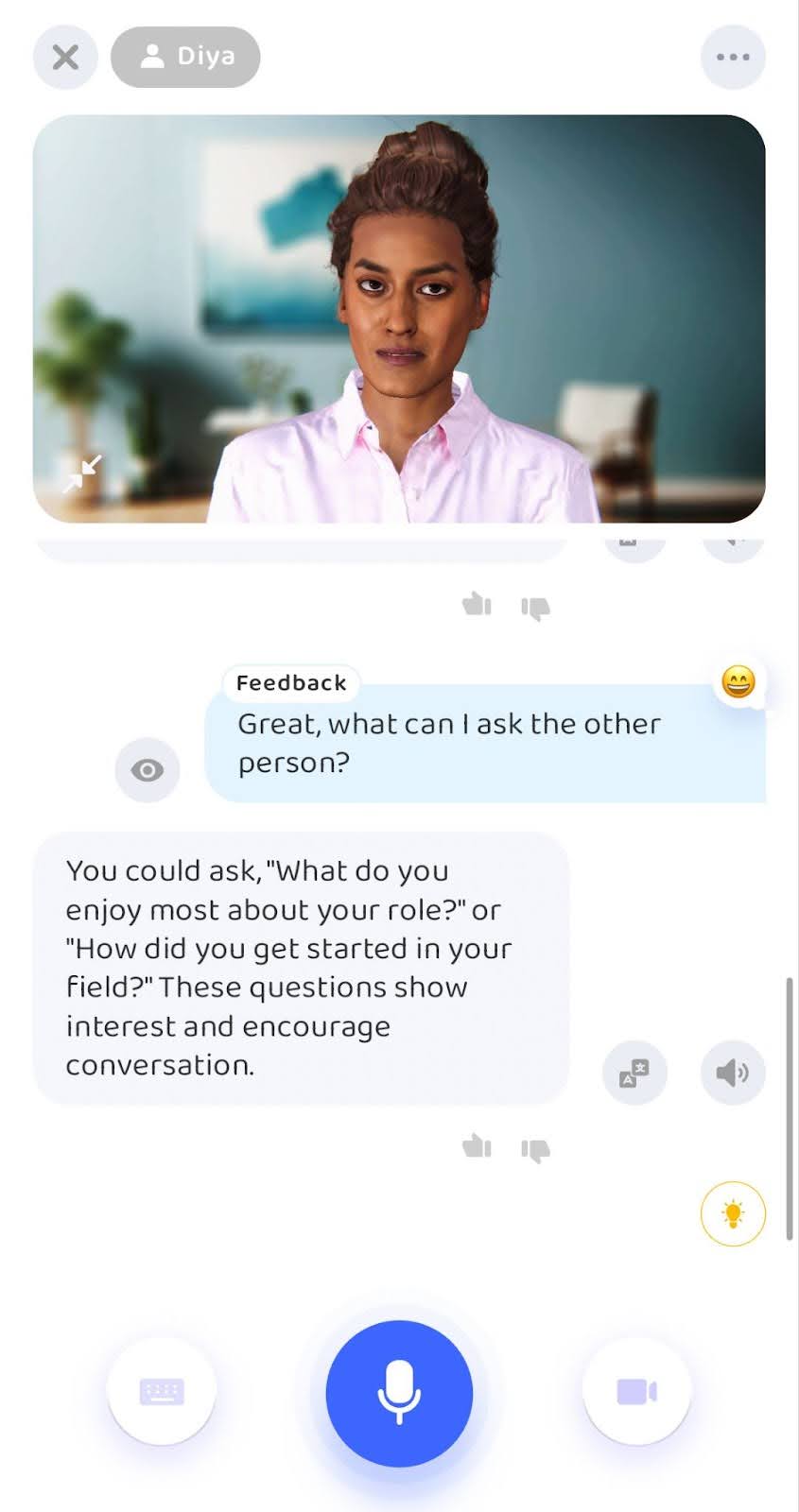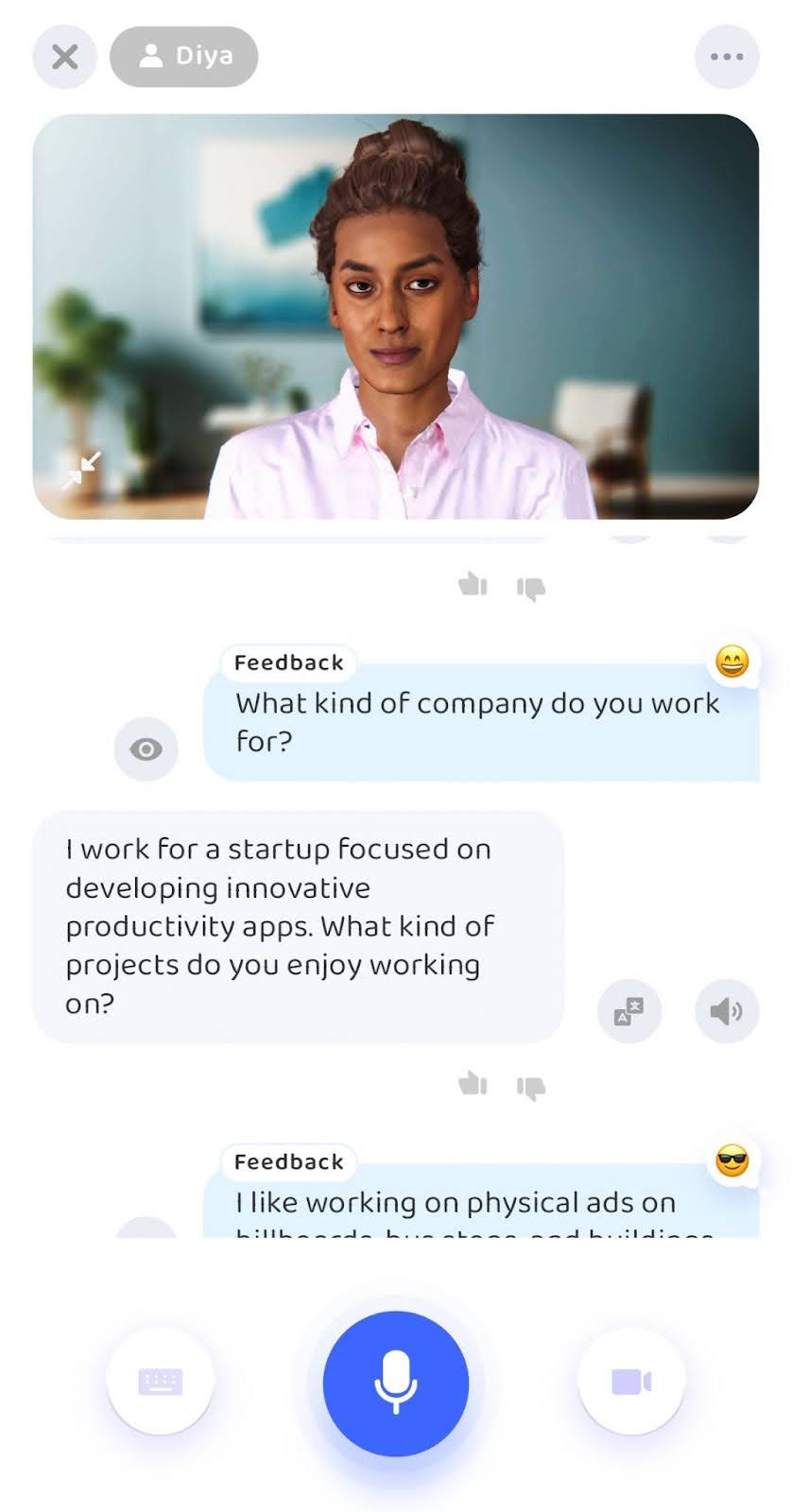Hi, I’m Diya! I’ve been living in Australia for seven years now, and one of the things I’ve learned along the way is just how important small talk is in building professional connections. Whether you’re reaching out on LinkedIn, attending a conference, or meeting someone at a casual networking event, knowing how to initiate and maintain a conversation in English can make a huge difference. In this blog, I’ll share some simple, yet powerful phrases to help you confidently break the ice and grow your network.
Essential Phrases for Business Small Talk
Small talk is a powerful tool to break the ice and build a connection. Here are some essential phrases that will help you sound natural and confident when starting and maintaining business conversations in English. You can practice all of these with me or my fellow AI colleagues.

Introducing Yourself
A friendly introduction is your first step in making a good impression. Here are a few simple ways to introduce yourself that will open up the conversation:
- “Hi, I’m [Name]. It’s great to meet you! What do you do?”
- “I saw your profile and noticed we share an interest in [topic].”
- “I’m currently working on [project] at [company]. How about you?”
These phrases are perfect for starting a conversation in both professional settings and casual meetups. By mentioning what you do, you give the other person something to respond to, which keeps the conversation flowing. Try it out with your AI English tutor in the Praktika app!
Asking About Their Work
Once you’ve introduced yourself, it’s time to show interest in the other person’s work. This helps keep the conversation going and shows you’re genuinely curious.
- “What’s the most exciting project you’re working on right now?”
- “How did you get started in [industry]?”
- “I’d love to hear more about your work with [company/organization].”
These phrases can be used in almost any business setting, and they show you’re interested in learning more about the other person’s role, which is crucial in networking.
Keeping the Conversation Going
Now that the conversation has started, you’ll want to keep it flowing. Here are some simple phrases to help:
- “That sounds really interesting—can you tell me more about [specific topic]?”
- “How do you see [topic/industry] evolving in the next few years?”
- “I was just thinking about something similar—what’s your take on [related topic]?”
These phrases help transition into more detailed discussions and give the other person a chance to share their thoughts, which makes the conversation more engaging.
Ending the Conversation Gracefully
When it’s time to wrap up the conversation, you’ll want to do so in a way that keeps the door open for future interactions. Here are a couple of polite ways to end:
- “It’s been great chatting with you. I’d love to stay in touch—let’s connect on LinkedIn!”
- “Thanks for sharing your insights, I really enjoyed our conversation!”
These phrases leave a positive impression and set the stage for future networking opportunities. Remember, one of the reasons Praktika is the best AI English learning app is that we help you with no judgement and as much repetition as you need! If you’re looking to improve your business small talk or focus on specific professional conversations, Praktika offers personalized study plans that target areas like LinkedIn messaging or event introductions. With a plan tailored to your needs, you can practice these essential phrases in relevant situations and feel more confident when networking in English.
Effective Strategies for Networking Success
Be Curious and Ask Open-Ended Questions
One of the easiest ways to keep a conversation going is by showing genuine interest in the other person’s experiences and ideas. Ask open-ended questions that invite them to share more about their work, passions, and professional journey. This not only helps you learn about them, but it also keeps the conversation flowing naturally.
- “What inspired you to pursue a career in [industry]?”
- “Can you tell me more about your role at [company]?”
- “What challenges do you think professionals in [field] will face in the next few years?”
These types of questions allow the other person to share insights and thoughts that may spark further discussion, creating a more engaging conversation for both of you.

Listen Actively and Respond Thoughtfully
Active listening is a key part of successful networking. It’s not just about hearing what the other person says; it’s about understanding and responding thoughtfully. Show you’re engaged by nodding, making eye contact, and giving verbal cues like “That’s interesting,” or “Tell me more about that.” When you respond, try to build on what they’ve said by offering your own thoughts or asking a follow-up question.
For example, if someone shares a recent project they worked on, you could respond with:
- “That sounds like an amazing project. What was the biggest takeaway you learned from it?”
- “I’ve been thinking about something similar myself—how did you approach [specific challenge]?”
This keeps the conversation interactive and allows you to learn more about the person’s experiences, making you more memorable in the process.
Use Compliments and Shared Interests to Build Rapport
People love to talk about things they’re passionate about, and using shared interests or offering genuine compliments can be a great way to strengthen your connection. Complimenting someone’s work, style, or achievements helps build rapport and makes the other person feel appreciated.
- “I love how you approached [specific project]. It’s such a creative solution!”
- “I noticed you’re into [shared interest]. I’ve always wanted to learn more about that. Any recommendations?”
Be sincere when you offer compliments or discuss shared interests. People can tell when you’re being genuine, and this helps build a foundation of trust.
Transition from Small Talk to Professional Discussion
Once you’ve established rapport, it’s time to shift the conversation to professional topics that align with your goals. After asking a few questions about their work or interests, try to steer the conversation toward how you can collaborate or share insights. This shows that you’re not just interested in small talk, but that you’re thinking about how you can form a mutually beneficial connection.
- “It sounds like we’re both passionate about [topic]. Maybe we could collaborate or share resources on it?”
- “I’d love to connect more and discuss how we can help each other in [specific area].”
These statements shift the conversation into more professional territory and open the door to potential future collaboration or opportunities.
Don’t Be Afraid to Follow Up
A great networking conversation doesn’t end when you say goodbye. The follow-up is just as important. After meeting someone at an event or connecting on LinkedIn, send them a quick message thanking them for the conversation and reinforcing your interest in staying in touch.
- “Hi [Name], it was great meeting you at [event]. I really enjoyed learning about your work in [specific area]. Let’s connect soon!”
- “Thank you for the great chat at [conference]. I’d love to continue our conversation about [topic] and explore ways we can collaborate.”
This shows that you’re proactive and truly value the connection. A quick follow-up can often turn a short encounter into a lasting professional relationship. To help you feel more confident using these strategies, Praktika provides interactive role-playing scenarios that mimic real networking situations.
Use the Praktika AI App to Feel Confident Networking in English
Role-Playing Scenarios for Real-Life Networking Practice
As I mentioned earlier, one of the best ways to build confidence in any language is through role-playing. These role-plays are designed to help you practice business small talk and networking in realistic settings. By practicing with a virtual AI English tutor, like me, you can get used to responding quickly and appropriately in English. These exercises allow you to build the skills you need without the pressure of real-life stakes.

Fluency and Confidence Building
Networking can feel intimidating, especially if you’re not yet confident in your English skills. But with Praktika, you don’t have to worry about awkward pauses or not knowing what to say. For instance, when you practice speaking your introduction or response in a role-play, your AI English tutor gives you immediate feedback on areas like pronunciation, and word choice. Over time, this consistent practice boosts both your fluency and your confidence, making networking in English feel like second nature.
Networking Made Easy with the Right Tools
With Praktika as your AI English learning tool, you won’t just learn the language; you’ll get real-time tips and practical advice tailored to your career growth. By practicing personalized scenarios, receiving real-time feedback, and refining your fluency, you’ll find that building professional connections in English becomes second nature. So why wait? Start making meaningful connections today—let Praktika help you unlock your networking potential! Sign up for Praktika now and start networking like a pro!

From Diya
Diya is an English tutor dedicated to helping students achieve their study abroad dreams. With over seven years of experience in Australia, she helps students build confidence in academic English and prepare for their first semester. Diya also runs a hiking club for Melbourne’s Indian community, connecting with people from all backgrounds. Whether you need support with academic English or everyday situations, Diya is here to guide you through your journey.
